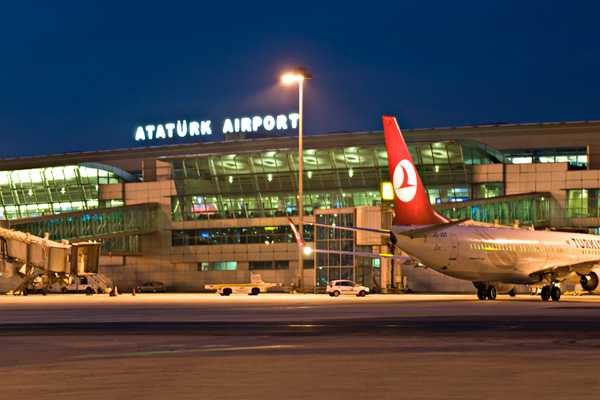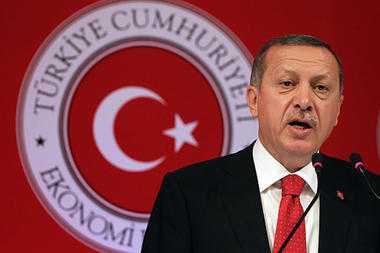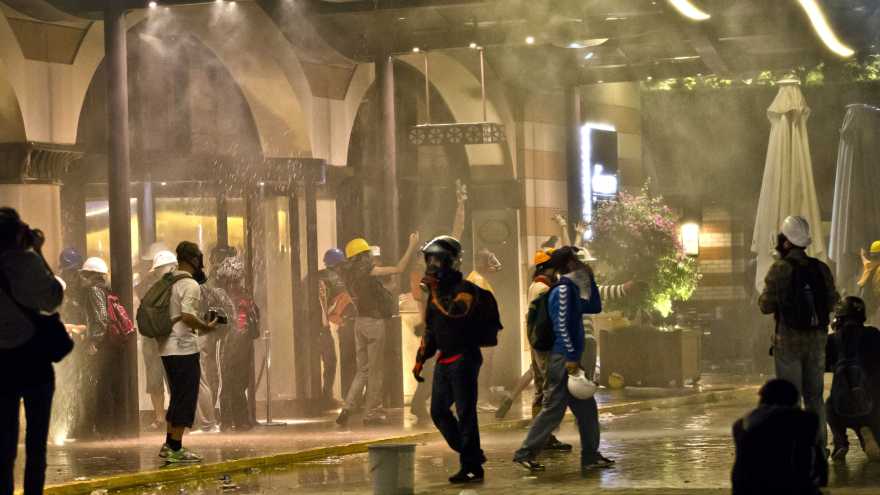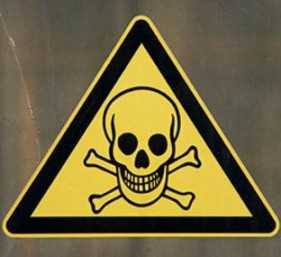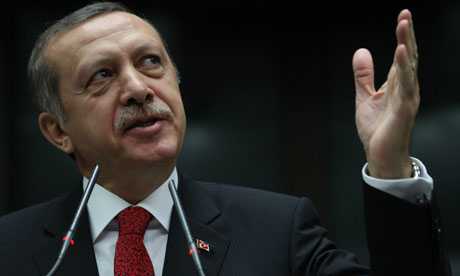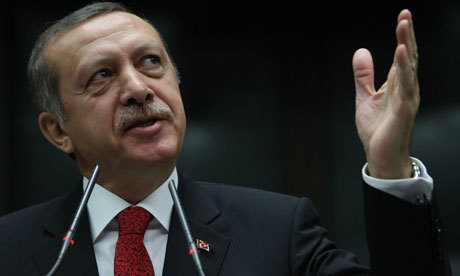WND EXCLUSIVE
U.S. military confirms rebels had sarin
Classified document shows deadly weapon found in home of arrested Islamists
 F. Michael Maloof
F. Michael Maloof
F. Michael Maloof, staff writer for WND and G2Bulletin, is a former senior security policy analyst in the office of the secretary of defense.
As part of the Obama administration’s repeated insistence – though without offering proof – that the recent sarin gas attack near Damascus was the work of the Assad regime, the administration has downplayed or denied the possibility that al-Qaida-linked Syrian rebels could produce deadly chemical weapons.
However, in a classified document just obtained by WND, the U.S. military confirms that sarin was confiscated earlier this year from members of the Jabhat al-Nusra Front, the most influential of the rebel Islamists fighting in Syria.
The document says sarin from al-Qaida in Iraq made its way into Turkey and that while some was seized, more could have been used in an attack last March on civilians and Syrian military soldiers in Aleppo.
The document, classified Secret/Noforn – “Not for foreign distribution” – came from the U.S. intelligence community’s National Ground Intelligence Center, or NGIC, and was made available to WND Tuesday.
It revealed that AQI had produced a “bench-scale” form of sarin in Iraq and then transferred it to Turkey.
A U.S. military source said there were a number of interrogations as well as some clan reports as part of what the document said were “50 general indicators to monitor progress and characterize the state of the ANF/AQI-associated Sarin chemical warfare agent developing effort.”
“This (document) depicts our assessment of the status of effort at its peak – primarily research and procurement activities – when disrupted in late May 2013 with the arrest of several key individuals in Iraq and Turkey,” the document said.
“Future reporting of indicators not previously observed would suggest that the effort continues to advance despite the arrests,” the NGIC document said.
The May 2013 seizure occurred when Turkish security forces discovered a two-kilogram cylinder with sarin gas while searching homes of Syrian militants from the al-Qaida-linked Jabhat al-Nusra Front following their initial detention.
The sarin gas was found in the homes of suspected Syrian Islamic radicals detained in the southern provinces of Adana and Mersin.
Some 12 suspected members of the al-Nusra Front were arrested. At the time, they were described by Turkish special anti-terror forces as the “most aggressive and successful arm” of the Syrian rebels.
In the seizure, Turkish anti-terror police also found a cache of weapons, documents and digital data.
At the time of the arrest, the Russians called for a thorough investigation of the detained Syrian militants found in possession of sarin gas.
This seizure followed a chemical weapons attack in March on the Khan al-Assal area of rural Aleppo, Syria. In that attack, some 26 people and Syrian government forces were killed by what was determined to be sarin gas, delivered by a rocket attack.
The Syrian government called for an investigation by the United Nations. Damascus claimed al-Qaida fighters were behind the attack, also alleging that Turkey was involved.
“The rocket came from a place controlled by the terrorists and which is located close to the Turkish territory,” according to a statement from Damascus. “One can assume that the weapon came from Turkey.”
The report of the U.S. intelligence community’s NGIC reinforces a preliminary U.N. investigation of the attack in Aleppo which said the evidence pointed to Syrian rebels.
It also appears to bolster allegations in a 100-page report on an investigation turned over to the U.N. by Russia. The report concluded the Syrian rebels – not the Syrian government – had used the nerve agent sarin in the March chemical weapons attack in Aleppo.
While the contents of the report have yet to be released, sources tell WND the documentation indicates that deadly sarin poison gas was manufactured in a Sunni-controlled region of Iraq and then transported to Turkey for use by the Syrian opposition, whose ranks have swelled with members of al-Qaida and affiliated groups.
The documentation that the U.N. received from the Russians indicated specifically that the sarin gas was supplied to Sunni foreign fighters by a Saddam-era general working under the outlawed Iraqi Baath party leader, Izzat Ibrahim al-Douri.
Al-Douri was a top aide to Saddam Hussein before he was deposed as Iraqi president.
The sarin nerve gas used in the Allepo attack, sources say, had been prepared by former Iraqi Military Industries Brig. Gen. Adnan al-Dulaimi. It then was supplied to Baath-affiliated foreign fighters of the Sunni and Saudi Arabian-backed al-Nusra Front in Aleppo, with Turkey’s cooperation, through the Turkish town of Antakya in Hatay Province.
The source who brought out the documentation now in the hands of the U.N. is said to have been an aide to al-Douri.
Al-Dulaimi was a major player in Saddam’s chemical weapons production projects, the former aide said. Moreover, Al-Dulaimi has been working in the Sunni-controlled region of northwestern Iraq where the outlawed Baath party now is located and produces the sarin.
The NGIC depiction of the variety of sarin as “bench-scale” reinforces an analysis by terrorism expert Yossef Bodansky, who said the recent findings on the chemical weapons attack of Aug. 21 on the outskirts of Damascus, Syria, was “indeed a self-inflicted attack” by the Syrian opposition to provoke U.S. and military intervention in Syria.
Bodansky, a former director of the U.S. Congressional Task Force on Terrorism and Unconventional Warfare, said a preliminary analysis of the sarin showed that it was of a “kitchen” variety and not military grade.
He questioned that the sarin was of a military variety, which accumulates around victims’ hair and loose clothing.
Because these molecules become detached and released with any movement, Bodansky said, “they would have thus killed or injured the first responders who touched the victims’ bodies without protective clothes … and masks.”
Various videos of the incident clearly show first responders going from patient to patient without protective clothing administering first aid to the victims. There were no reports of casualties among the first responders.
“This strongly indicates that the agent in question was the slow acting ‘kitchen sarin,’” Bodansky said.
“Indeed, other descriptions of injuries treated by MSF (The French group Doctors Without Borders) – suffocation, foaming, vomiting and diarrhea – agree with the effects of diluted, late-action drops of liquefied Sarin,” he said.
The terrorism expert said that the jihadist movement has technologies which have been confirmed in captured jihadist labs in both Turkey and Iraq, as well as from the wealth of data recovered from al-Qaida in Afghanistan in 2001 and 2002.
He added that the projectiles shown by the opposition, which were tested by U.N. inspectors, are not standard weapons of the Syrian army.
Meanwhile, an Italian former journalist and a Belgian researcher who were recently freed from their al-Nusra captives say they overheard their captors talking about their involvement in a deadly chemical attack “last month,” which would have been the Aug. 21 chemical weapons attack.
The Italian, Domenico Quirico, and Belgian researcher Pierre Piccinin were released Monday after five months of captivity.
“The government of Bashar al-Assad did not use Sarin gas or other types of gas in the outskirts of Damascus,” Piccinin said.
While captive, Piccinin said the two had overheard a Skype conversation in English among three people.
“The conversation was based on real facts,” said Quirico, claiming one of the three people in the alleged conversation identified himself as a Free Syrian Army general.
He added that the militants said the rebels carried out the attack as a provocation to force the West to intervene militarily to oust the Assad regime.
Both men told a news conference they had no access to the outside world while they were held captive and knew nothing about the use of chemical weapons until they heard the discussion on Skype.
Now, a former analyst for the Central Intelligence Agency, Ray McGovern, similarly backs the claim that the Syrian rebels perpetrated the poison gas attack on Aug. 21
McGovern was one of a number of veteran intelligence professionals who recently signed a letter to Obama saying that Damascus wasn’t behind the Aug. 21 chemical attack.
As WND recently reported, former U.S. intelligence analysts claim current intelligence analysts have told them Assad was not responsible for the Aug. 21 poison gas attack, saying there was a “growing body of evidence” that reveals the incident was a pre-planned provocation by the Syrian opposition.
The analysts, in an open letter to Obama, referred to a meeting a week before the Aug. 21 incident in which opposition military commanders ordered preparations for an “imminent escalation” due to a “war-changing development” that would be followed by the U.S.-led bombing of Syria. They said the growing body of evidence came mostly from sources affiliated with the Syrian opposition and its supporters.
Those reports, they said, revealed that canisters containing chemical agents were brought into a suburb of Damascus, where they were then opened.
“Initial meetings between senior opposition military commanders and Qatari, Turkish and U.S. intelligence officials took place at the converted Turkish military garrison in Antakya, Hatay Province, now used as the command center and headquarters of the Free Syrian Army and their foreign sponsors,” the analysts said.
The VIPS memo to Obama reinforces separate videos, which show foreign fighters associated with the Syrian opposition firing artillery canisters of poison gas. One video shows Nadee Baloosh, a member of an al-Qaida-affiliated group Rioyadh al-Abdeen, admitting to the use of chemical weapons.
In the video clip, al-Abdeen, who is in the Latakia area of Syria, said his forces used “chemicals which produce lethal and deadly gases that I possess.”


